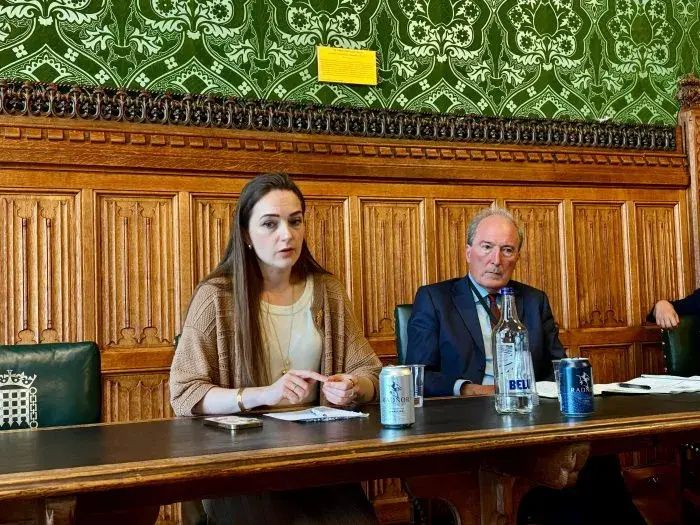Nobel Peace Prize laureate on russia's war crimes and global justice
- Natalia Tronenko
- Jun 22, 2025
- 4 min read
Updated: Jun 23, 2025
UAID International was invited to a powerful conversation at the UK Parliament, hosted by Lord Moore of Etchingham. The discussion featured Ukrainian human rights lawyer and Nobel Peace Prize laureate Oleksandra Matviichuk, who addressed the ongoing war crimes committed by the Russian Federation — particularly the mass abduction of Ukrainian children.

The audience included scholars from the War Studies Department at King’s College London and members of the press. Over the course of two hours, Matviichuk spoke with extraordinary clarity and legal precision — as well as deep humanity. Her words struck an even deeper chord in us following the most recent brutal attack on Kyiv and the tragic loss of life in the Solomianskyi district just days ago.
One of the most powerful concepts she spoke about was the “lack of imagination” — the West’s inability to grasp the true nature of the threat posed by imperial Russia, particularly those countries not sharing a direct border. She warned that no empire truly has borders….. think about it.
This seemed a somewhat philosophical statement. But as I reflected more, it became painfully clear: just as no one in Ukraine could have imagined such ruthless, relentless bombing of civilians in major cities like Kyiv — the West, too, cannot imagine this violence reaching their own homes. This lack of imagination is paralysing international response. Most countries, except for Ukraine’s closest neighbours who remember their own histories, believe “this couldn’t happen to us.”
Matviichuk shared chilling numbers: at least 26,000 Ukrainian children have been forcibly abducted to Russia since 2014, though the real number is almost certainly far higher. These children are subjected to forced adoptions, a systematic erasure of identity, and complete reprogramming. Infants and toddlers are adopted into Russian families — not out of compassion, but for financial incentives. Their names, documents, and identities are erased. Many may never be found again. The goal is simple: to raise mankurts — children stripped of memory and identity, raised in total loyalty to the state.
Older children, she said, are trained to accept their new fate as obedient, future soldiers. By age 14, they are issued Russian passports. By 18, they are expected to serve as frontline troops — cannon fodder.
Even more harrowing: around 1.6 million teenagers on Russia-occupied Ukrainian territories are being systematically prepared to act as kamikaze fighters — conditioned to kill without thought, stripped of agency, taught to follow orders blindly. Matviichuk warned that these young soldiers will not stop with Ukraine. “After us, they will march into neighbouring European nations.”
What many may not know is that just a day before this speech in Parliament, Matviichuk met with King Charles III, offering him a drawing made by a Ukrainian child — a deeply symbolic gesture. One can only hope she shared the same haunting statistics with His Majesty.

At the end of her address in the House of Lords, she presented Lord Moore with a book by the late Ukrainian writer Victoria Amelina, who was killed by a Russian missile in the summer of 2023 while documenting war crimes in Donbas. I will always remember Amelina’s haunting poem — one that captures in just a few lines the horror of war and the unbearable randomness of survival:
Air Raid Alert
The air raid siren sounds across the country
As if they’re lining us all up for execution
Every one of us.
But they only strike one.
Usually someone on the edge.
Today, it’s not you.
All clear.
Among the most disturbing parts of Matviichuk’s message was this: Russia has never been truly held accountable. Not after Georgia, not after Crimea, not after Syria. Unlike Nazi Germany, the Russian Empire — from the USSR to today’s Federation — has escaped meaningful consequences for its atrocities. This culture of impunity emboldens further violence.
Even today, over €300 million in frozen Russian assets remain locked in Brussels — but these sanctions must be renewed every six months by unanimous vote. There is a real danger that countries like Hungary could vote against the extension, potentially releasing these funds back to Russia. This is not just a legal technicality — it is a test of the West’s moral clarity and political will. The West must grasp the urgency and systemic nature of this war and help Ukraine endure this blood-soaked battle not symbolically, but structurally and decisively.
Matviichuk reminded the audience that geopolitics can never be abstract. Behind every statistic is a human life. She recounted the stories of people tortured in Russian captivity, of children torn from their siblings and adopted into Russian families, some of whom later took their own lives after being completely severed from their identities and loved ones.
Her final message was one of defiance and resilience: the world expected Ukraine to crumble — to play the part of a powerless victim under the weight of empire. But Ukraine cannot surrender. Not to survive. Not to remain a nation.
She ended with a message about peace and strength:
“Ukrainians want peace more than anyone else. But we also understand something crucial — peace does not come from surrendering to occupation.”
This comprehensive account of Oleksandra's Matviichuk insight into russia's war crimes against Ukraine has been prepared for UAID by our dedicated volunteer Tetyana Bazylevych.

Comments